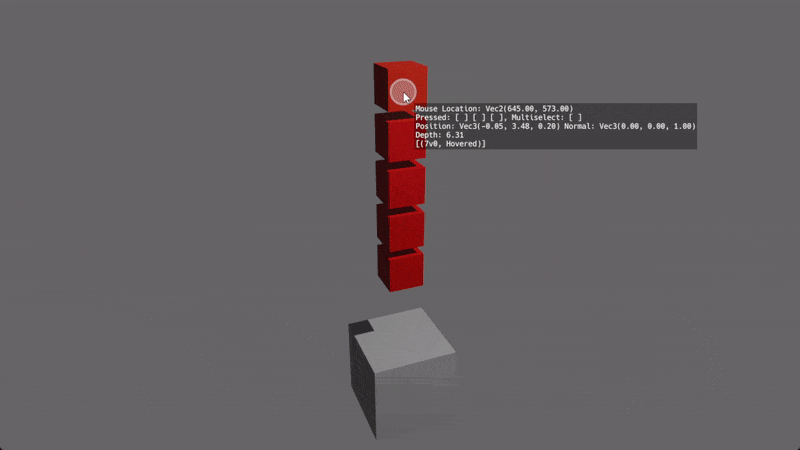44 releases (19 breaking)
| 0.20.1 | Jul 9, 2024 |
|---|---|
| 0.20.0-rc.1 | Jun 30, 2024 |
| 0.18.2 | Mar 8, 2024 |
| 0.17.0 | Nov 10, 2023 |
| 0.2.0 | Nov 7, 2020 |
#61 in Rendering
9,983 downloads per month
Used in fewer than 20 crates
7.5MB
2K
SLoC
Picking and Pointer Events for Bevy

A flexible set of plugins that add picking functionality to your bevy app. Want to drag a UI
entity and drop it onto a 3D mesh entity? This plugin allows you to add event listeners to any
entity, and works with mouse, touch, or even gamepads.
Highlights
- Lightweight: only compile what you need.
- Expressive: event listener components
On::<Pointer<Click>>::run(my_system). - Input Agnostic: control pointers with mouse, pen, touch, or custom bevy systems.
- Modular Backends: mix and match backends like
rapier,egui,bevy_ui, or write your own.
Lightweight
Only compile what you use. All non-critical plugins can be disabled, including highlighting,
selection, and any backends not in use. The crate uses no external dependencies unless you need it
for a backend, e.g. egui or rapier.
Expressive
The On::<Pointer<E>> event listener component makes it easy to react to pointer interactions like
Click, Over, and Drag. Events bubble up the entity hierarchy starting from their target
looking for event listeners, and running any listener's callbacks. These callbacks are normal bevy
systems, though a number of helpers are provided to reduce boilerplate:
commands.spawn((
PbrBundle { /* ... */ },
// These callbacks are run when this entity or its children are interacted with.
On::<Pointer<Move>>::run(change_hue_with_vertical_move),
// Rotate an entity when dragged:
On::<Pointer<Drag>>::target_component_mut::<Transform>(|drag, transform| {
transform.rotate_local_y(drag.delta.x / 50.0)
}),
// Despawn an entity when clicked:
On::<Pointer<Click>>::target_commands_mut(|_click, target_commands| {
target_commands.despawn();
}),
// Send an event when the pointer is pressed over this entity:
On::<Pointer<Down>>::send_event::<DoSomethingComplex>(),
));
If you don't need event bubbling or callbacks, you can respond to pointer events like you would any
other bevy event, using EventReader<Pointer<Click>>, EventReader<Pointer<Move>>, etc.
Input Agnostic
Pointers can be controlled with anything, whether it's the included mouse or touch inputs, or a custom gamepad input system you write yourself.
Modular Backends
Picking backends run hit tests to determine if a pointer is over any entities. This plugin provides
an extremely simple API to write your own backend in
about 100 lines of code; it also includes half a dozen backends out of the box. These include
rapier, egui, and bevy_ui, among others. Multiple backends can be used at the same time!
You can have a simple rect hit test backend for your UI, a GPU picking shader for your 3D scene, and this plugin will handle sorting hits and generating events.
Robust
In addition to these features, this plugin also correctly handles multitouch, multiple windows, render layers, viewports, and camera order.
Getting Started
Making objects pickable is pretty straightforward. In the most minimal cases, it's as simple as adding the plugin to your app:
.add_plugins(DefaultPickingPlugins)
and adding the PickableBundle to entities that can be picked with the backends you are using:
commands.spawn((
PbrBundle::default(), // The `bevy_picking_raycast` backend works with meshes
PickableBundle::default(), // Makes the entity pickable
));
You can find a list of built-in backends here
Next Steps
To learn more, read the docs and take a look at the examples in the /examples directory. Understanding bevy_eventlistener will also help. Once you are comfortable with that, this crate's event_listener example is a great place to start.
Bevy Version Support
| bevy | bevy_mod_picking |
|---|---|
| 0.14 | 0.20 |
| 0.13 | 0.18, 0.19 |
| 0.12 | 0.17 |
| 0.11 | 0.15, 0.16 |
| 0.10 | 0.12, 0.13, 0.14 |
| 0.9 | 0.10, 0.11 |
| 0.8 | 0.8, 0.9 |
| 0.7 | 0.6, 0.7 |
| 0.6 | 0.5 |
| 0.5 | 0.4 |
| 0.4 | 0.3 |
| 0.3 | 0.2 |
| 0.2 | 0.1 |
License
All code in this repository is dual-licensed under either:
- MIT License (LICENSE-MIT or http://opensource.org/licenses/MIT)
- Apache License, Version 2.0 (LICENSE-APACHE or http://www.apache.org/licenses/LICENSE-2.0)
at your option. This means you can select the license you prefer.
Your contributions
Unless you explicitly state otherwise, any contribution intentionally submitted for inclusion in the work by you, as defined in the Apache-2.0 license, shall be dual licensed as above, without any additional terms or conditions.
Dependencies
~35–75MB
~1.5M SLoC